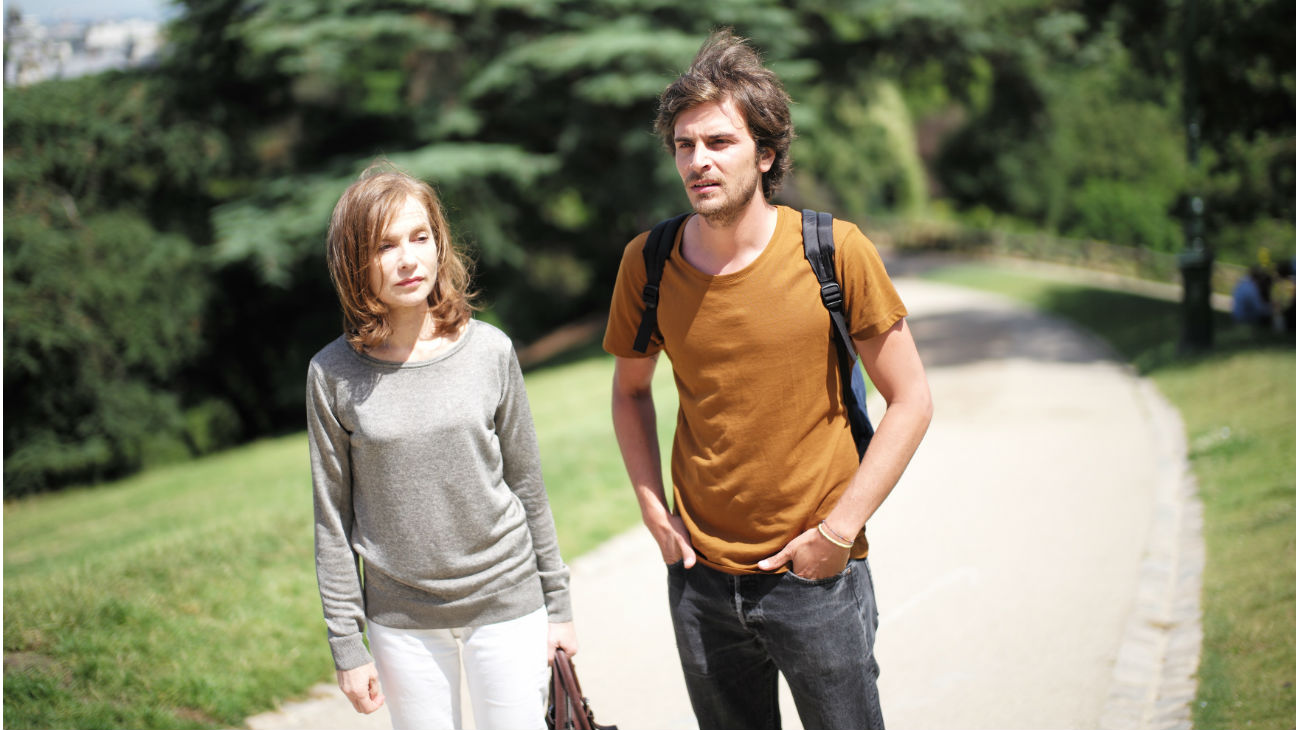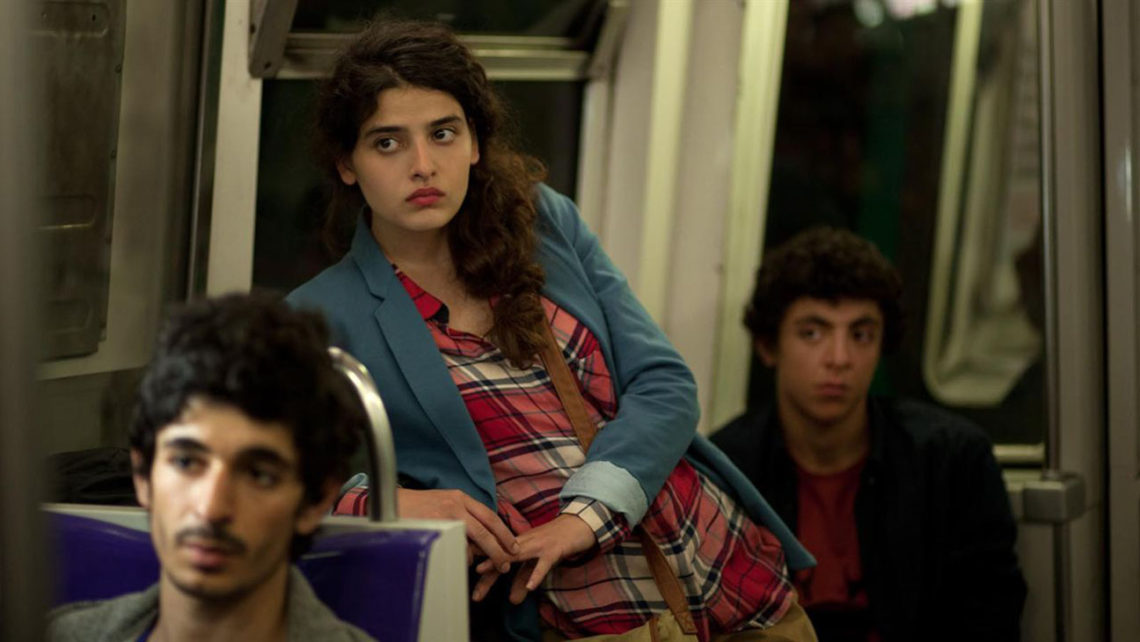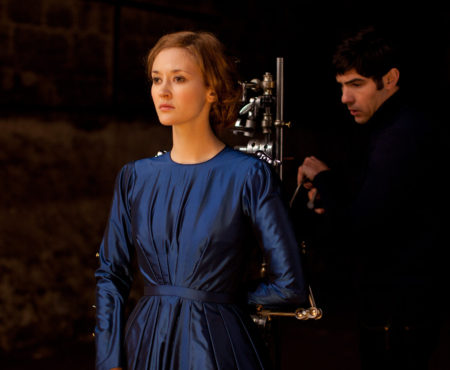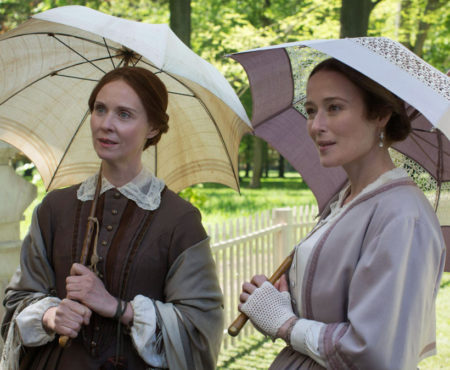Nocturama begins with a lengthy, virtually wordless parallel-editing sequence in which a series of young French students carry out small, coordinated actions in their respective rounds. All wear somber facial expressions rigidly composed to look innocuous and casual, but to the viewer, it’s apparent they are each, in their own united way, doing something sketchy across Paris. In fact, they are planning a multi-thronged terrorist attack. This sequence goes on seemingly forever. Maybe 30 minutes? Or 40. Or even longer. One of the teens shoots some well-known businessman. The others plant bombs throughout Paris in quarters deliberately chosen for their vacancy. They want to send a “message” of political import that is shocking but not harmful. The first half of the film takes us through the intense planning and elaborate execution of the teens’ plan, masterminded by a much older political activist. We are occasionally treated to flashbacks when the students become connected to one another, mostly through school, and realize they are all driven by a desire—no matter how amorphous—to politically engage the world. Each of them is socially awkward, unsurprisingly. They rely on the oldest member to help logistically plan the multifaceted attack, but as it turns out, mechanics of the plan contain so many individual cogs that all it takes is one small jam to blow up the entire operation, or reveal them despite the many precautions they take to be anonymous.
The kids then arrange to meet at a large, expensive department store inside a mall after closing hours and after rigging the building’s security. Here, it is decided that they will wait out the immediate aftermath, fearing that if they all went home they might be apprehended right away. Of course, shacking up together in an easy-to-access building is a poorly thought-out idea considering that they already assume the police might identify them as the perpetrators. At the mall, with ample time to think about what they’ve just done, see the attacks on television, get bored and start playing with all the expensive furniture, clothing and toys available at the mall, the kids start becoming stir-crazy. One of them stupidly invites a homeless couple to luxuriate in the materialism. Another blasts hip-hop and lip-syncs. Yet another rides a large toy car around the building. There are many implicit film references in Nocturama: The Shining, Dawn of the Dead, Battle of Algiers, French student-political films like La Chinoise and Something in the Air, and even The Warriors, considering the film’s keen focus on defiance in youth culture. While the editing rhythm of its first half is a little tedious due to its unevenness, Nocturama slowly but surely becomes a boldly explicit film that arouses the viewer’s sympathies in these tragic, pathetic figures, with a shocking ending that guts a most powerful punch.

The post-apocalyptic zombie film The Girl With All the Gifts has one of those allegorical ideas that is half-interesting and half-gimmicky; regardless, considering that the sub-genre has eaten itself whole, the film’s worth giving a chance. The good-natured and brilliant young girl Melanie (Sennia Nanua) lives in a very strange prison where her body, limbs, and head are shackled and confined in a wheelchair, and every time she is wheeled out of her cell to a classroom, a series of guards must accompany her, all on high alert. So why is this sweet little girl deemed dangerous? Melanie and her peers are an anomaly to the zombie virus that took out most of the human population on earth. These children carry the same infection as the “hungries” but for the most part are still considerably human-like. The only reason why they haven’t been killed is so the military operation’s doctor (a deliciously evil Glenn Close) can conduct experiments on their brains, one by one, to find a cure. Melanie is bonded with the one person who doesn’t seem to think the children are subhuman: Ms. Justineau (Gemma Arterton), who teaches the children a regular school curriculum to keep them psychologically healthy. A cataclysmic event sets off a new direction for Melanie, the teacher, doctor, and Sergeant (Paddy Considine). While on the run, the pragmatism of surviving the zombies does mean allowing Melanie a certain modicum of respect, as her invisibility to the hungries makes her an invaluable asset to their survival. The casting of a black girl as Melanie is of huge importance here and the film does a lot with the ideals of humanism playing off the xenophobic-like urgency of survival. But the film, directed by Colm McCarthy, carries many predictable markers of polished apocalypse movies and TV series that are so deliberate in making their ideas and theme match up in every line of dialogue that it moves along with an efficiency that feels too calculated to properly enjoy. That is, unless you really like sinking your teeth into zombie films, in which case, feast away.

Things to Come, Mia Hansen-Løve’s follow-up to Eden, is a decidedly more female-centric film, insofar as it deeply explores the interior life of its protagonist, Nathalie Chazeaux, a middle-aged professor played by Isabelle Huppert. This is the kind of role that fits Huppert like a glove—is it possible to say she’s too perfect at it? A series of life-altering events affect Nathalie virtually all at once and in every aspect of life: her prestigious academic work is being increasingly marginalized as publishers scale back production of her work; the stability of her marriage completely falters when her imbecile of a husband confesses infidelity; her melodramatic and needy mother is extremely ill; her daughter is about to give the family their first grandchild. Huppert’s unbreakable spirit and assertive presence shows how Nathalie weathers the storm. If Things to Come has any sort of message, it’s that women are the superior gender when surviving emotional duress, or conversely, that we should all aspire to be as courageous in life as Isabelle Huppert.
Nathalie does find a few small comforts in two spry individuals who come in and out of her life. There’s Pandora, the charming black cat Nathalie is forced to take care despite a lack of kitty-care experience and allergy. And there’s Fabien (Roman Kolinka), a high-minded former student who invites her to his communal farm home, where she can find some respite and reinvigorate her passion in philosophy (the film dabbles in an entertaining range of intellectual conversations that hint at the youthful naiveté of radical belief systems, and the ensconcing effect age has on them). Things to Come stays tonally consistent in spite of the protagonist’s many life challenges and upsets, and the film is exceptional in outlining how events, small and large, affect the ongoing mood and headspace of an individual who is clearly going through a hard time, and still managing to survive and live life. Yet the mood is never sappy or tragic—it’s wry. Hansen-Løve peppers the film with myriad tribulations but Nathalie’s ability to navigate them all undermines their significance, that is, in the greater scheme of things. It also promotes the need for self-care, and even if Nathalie doesn’t find what she’s looking for among the radical intellectuals who populate Fabien’s commune—in one hilarious moment, she finds a manifesto by the Unabomber on his bookshelf—Things To Come carries a surprisingly nuanced perspective on the sensibility in how to live life in spite of setbacks and discouragement of all forms: emotional, spiritual, intellectual, and physical. It’s a movie smart enough to know that Nathalie won’t find an answer in a black cat or a dashing young student. She’s got the power within herself to persevere.




















